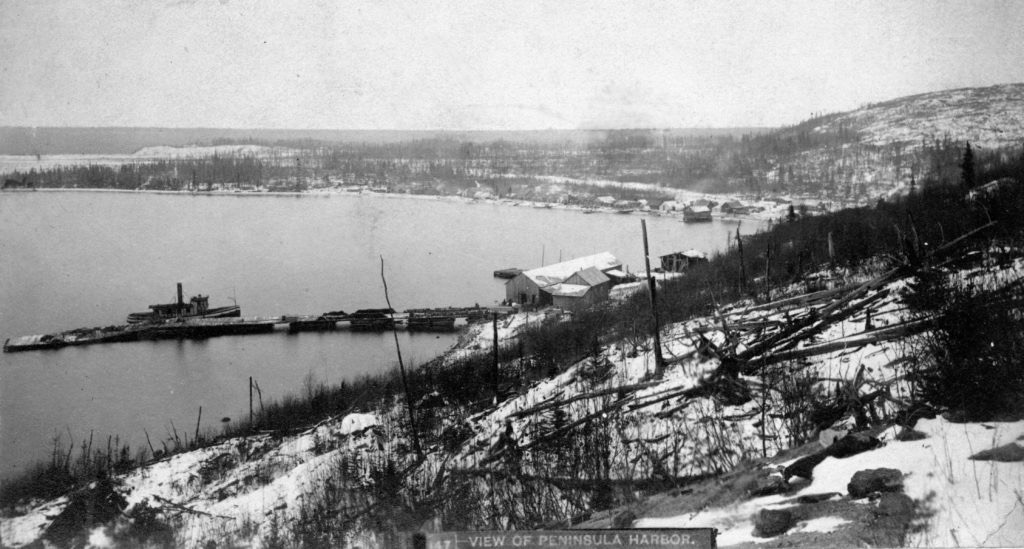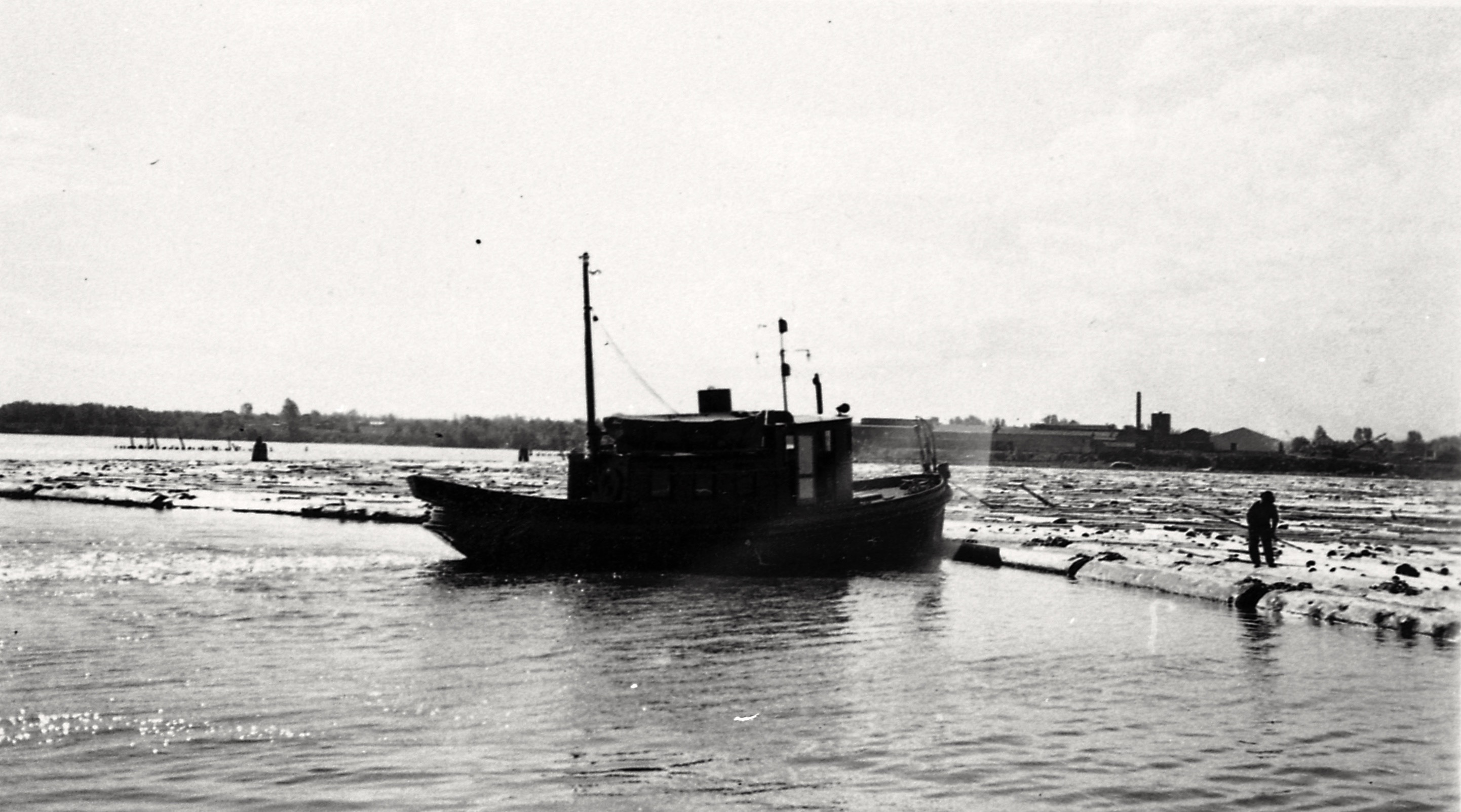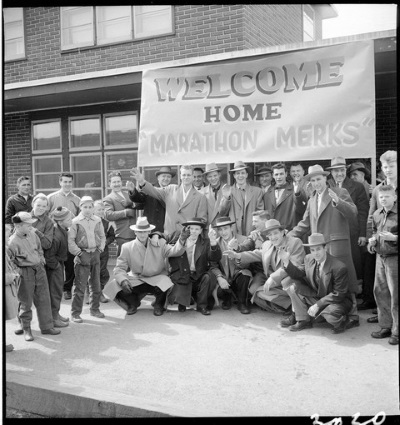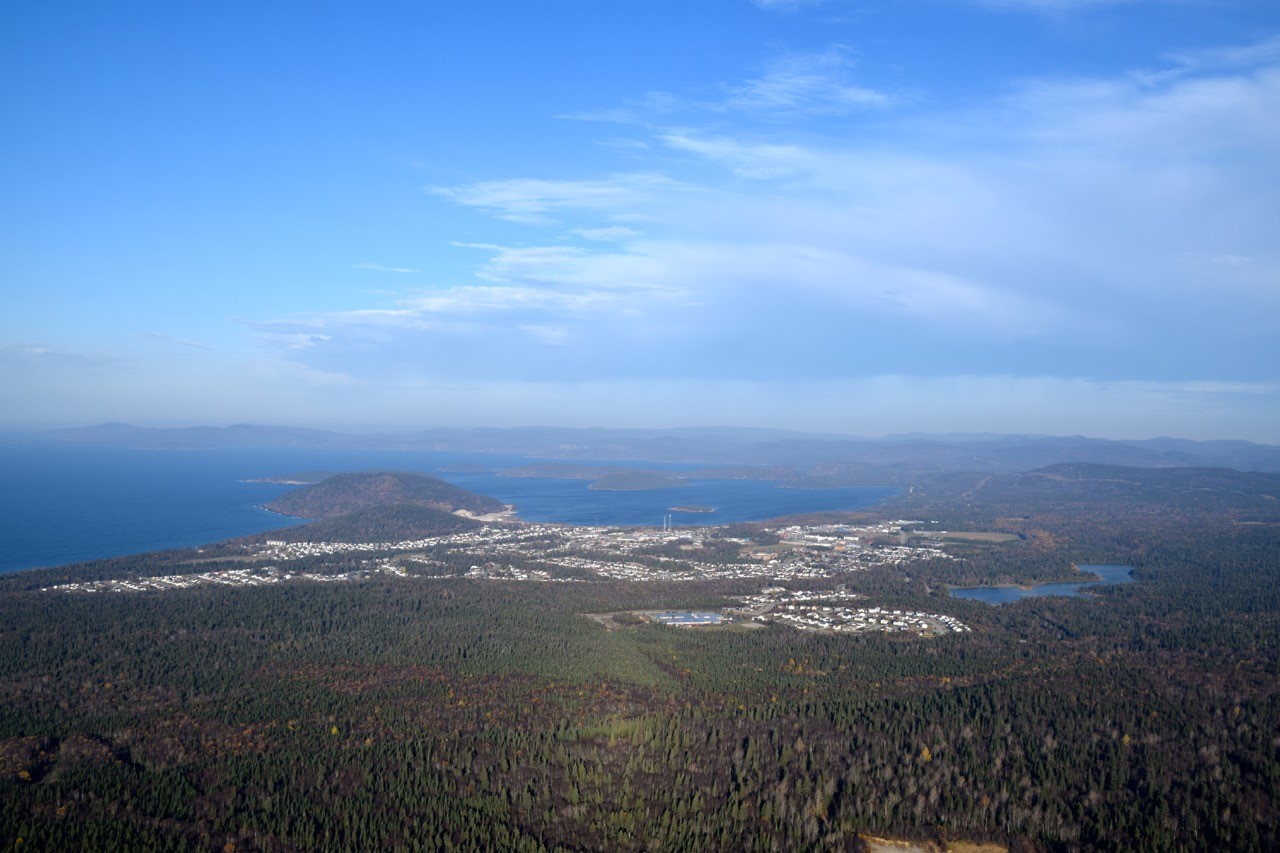| -
The Timeline was taken from rough notes found in the museum. Dates are currently being looked at for
accuracy. Please contact us with any errors.
1870
Surveying for the Railroad underway
Lake Superior, Fort Albany and Long Lake Railroad depicted on early maps
1880s
CPR construction. 12,000 men, 5000 horses and no police force. “Peninsula” (now
Marathon) was constructed as a “whistle stop” watering station for the steam locomotives. Water tower was built on
a hill to fill the on-board tanks. Peninsula remained in action until mid 1940s

1917
May 9th, Great Lakes Paper Company acquires the timber concession on the Big Pic
River
1931
Ontario Highway Construction Company assembles Camp 12 at Angler Ontario. It is one of the employment projects
in the 1930's to provide work for the unemployed. It was to construct sections of the TransCanada Highway. The road
bed can be seen along the existing Hwy. 17 west of Marathon.
1933
The Directors of Marathon Paper Mills began the Planning and design for the development of Marathon; the first
design and layout of the mill and townsite was started in two small rooms over the Citizens' State Bank of
Ontonagon, Michigan; there were only two employees designing and engineering the development up to 1944; that
ground was broken in April 1944; that the developement was considered a possible war industry.
1936
Marathon took steps to investigate Canadian woods operations to secure spruce pulpwood cutting rights in the
Province of Ontario, Canada. The General Timber Company Limited removed the first timber from Canadian Limits in
the spring of 1936.
1937
Marathon, through the General Timber Company Limited, secured allotment of 2,509 square miles of timberland
located along the Pic River in Ontario. The contract provided for the building of a bleached sulphate pulp mill in
Canada.
General Timber Company, the Canadian Branch of Marathon Paper Mills, begins logging on the lower limits of
the Big Pic Timber Concession
1937
W.E.Mair surveys Jellicoe Cove, (Peninsula Harbour).
D.C. Everest plans for a Sulphate Mill in Canada
1938
Marathon acquired the General Timber Company Limited, Port Arthur, Canada. General Timber had a concession of
2,509 square miles of spruce, balsam and other timber located in Ontario. Two objectives in obtaining Canadian
cutting rights were to secure a long time supply of spruce wood for the Rothschild pulp mill and also to secure a
cheap and continous supply of high grade wood from which to secure the highest grade of bleached sulphate pulp
possible to produce from a pulp mill to be built within the Province of Ontario on Lake Superior. This district is
noted for its purity of water and is so situated that it insured cheap transportation costs to the Rothschild,
Menasha, and Ashland plants and will provide a high grade bleached sulphate pulp for the Central West Pulp market
on a comparatively low delivered cost.
Rafts of Pulp Wood stored in Peninsula Harbour for towing to Ashland Wisconsin. General Timber tugs Handy
Andy and MPM accompany rafts as tenders

1940
July 1940 orders were given to construct 2 new Prisoners of War camps, one at Neys the other at
Angler, both had the capacity of 600 prisoners. These camps opened in July of 1941
1943
Population was 18.
On May 18, 1943 the name of General Timber Company Limited was changed to Marathon Paper Mills of Canada
Limited.
June marked the first visit of the Foundation Company Engineering group.
1944
April Ground was broken for the Mill construction site
May 18, 1944
Construction commenced on the townsite at Ontario, called Peninsula, later Everest and finally Marathon.
June 7, 1944 Contract was let for the construction of the plant and construction got underway
in July of 1944.
May Construction workers living in tents
Aug 26, 3RD Street was carved out of the wilderness to become Whitman Court
Prisoners of War working at the sawmill at Camp 35 on the Pic River
1945
Town temporarily called “Everest”
Spring melt caused the foundation of mill to sink into ground (because of beach sand). Construction was halted and
foundation torn down. Blasting of Peninsula Mountain began for better footing hold. Population explosion after the
war brought veterans and their families to new lives. Increase in CPR employees.
Marathon population about 2500.
Approximately 1300 men employed at the mill.
1946
December 31, 1946 Marathon became officially known as " The Improvement DIstrict of
Marathon"
Train station opened in Marathon replacing the one at Peninsula.
April 23 first pulp wood up the jack ladder
Sept 20 First digester cooked
Chapples Store opened October
First bale of pulp off the line at 10:30 PM, Oct 15. Bales are 500lbs each.
New mill building completed. Sulphate pulp shipped via railway cars to US market
Marathon Police Department and Fire Station building erected (on Stevens Ave, below Everest Hotel)
Strand Theatre construction commenced July 20
Recreation Hall construction commenced July 20
1947
Public Library opened in Rec. Hall building on Winton St. 1000 books donated by residents to start it up.
The Strand Theatre opened June
Rec Hall officially opened
1948
Outdoor pool built by volunteers
Bus service begins. Takes workers to and from mill, public to hospital and Chapples
Groups formed:Ballet and Tap; Marathon Guides and Brownies; Downhill Ski Club; Marathon Scouts and Cubs; Marathon
Figure Skating Club.
First skating on outdoor rink
1949
Street lights installed November 6th,
1951
Peninsula Golf Course construction commences
1953
August 10, the highway is opened between Marathonn and Terrace Bay
1954
Police Station Built
Marathon High School construction started
1955
July 6, 1955 New Post Office is Opened
1957
The Town is connected to the Ontario Hydro electric grid
School built on Stevens Ave.
1958
Marathon's streets are paved.

1960
Knights of Columbus begins
at 10:30 AM, September 17 the highway between Marathon and Sault Ste. Marie was opened
1970
Marathon becomes a Township – replacing Improvement District of Marathon
1980
Population 2300
1982
July 17, 1982 CFNO became live atfer testing for three
days. "93.1" Voice of North Superior, goes live.
1983
American Can. Canada sold to James River Corp.
Pukaskwa National Park officially opened
Last major River Drive
24 hour helicopter approved for Marathon Hospital
1984
Hemlo Gold explorations discover gold veins east of Marathon. Construction of
three new mines begins.
First flight to Marathon – Austin Airways
Marathon's first overseas ship of the season docks here for bales of pulp
Del Earle Park opens, named after founder.
Marathon Centre Mall begins construction
1985
Marathon Plaza Mall opens
September 6th Teck-Corona mines officially opened.
May 29th Teck-Corona pours gold at Hemlo Gold Mines
1987
Water Tower dismantled – underground reservoir built
Catholic School board begins construction of Holy Saviour School/École St. Sauveur
Confederation College sets up office 1987 Crimestoppers started
1988
Marathon builds ski slopes and Visitor Information Centre
New High School and Public Schools built
1985-1990s
Population of Marathon expands to nearly 6000 – miners, pulp mill workers
and CPR employees.
2000
Population 4700
2009
Last bale of Pulp produced Feb 28, 2009
Total production for the mill site 8,964,836 BADMT
Marathon Pulp Mill shuts down, jobs are lost
2013
Population 4400
2014
Demolition of the Marathon Mill commences, completion set for 2015
Marathon Curling Club closes it's doors
2016
D & H Foods closes
Dec 16 Everest Hotel burns to the ground
Trinity Anglican Church closes and is sold
2017
Demolition and Stabilization of the Pulp Mill site schedules to be completed by
June.

2019
November, Mill effluent site cleanup complete.
Construction camp for Vallard construction begins on the Stevens Avenue School propety
2020
March 20 Toronto Dominion removes ATM from the former TD bank Lobby.
| 



